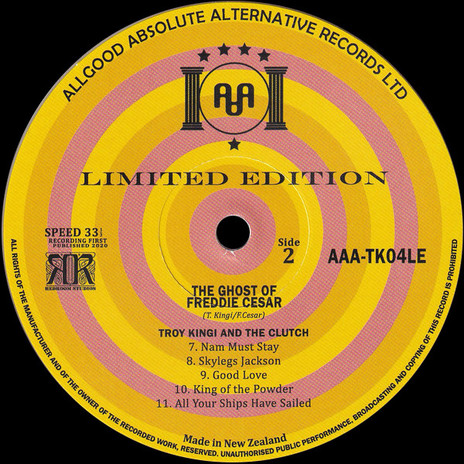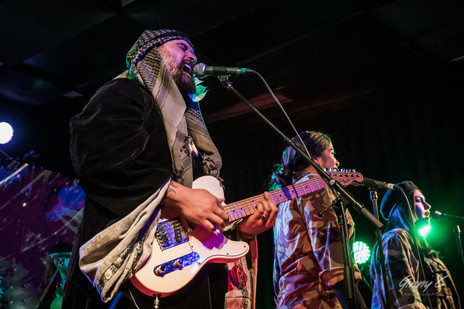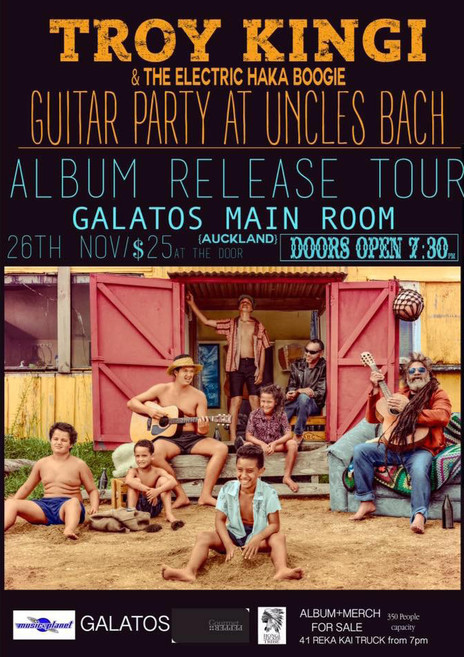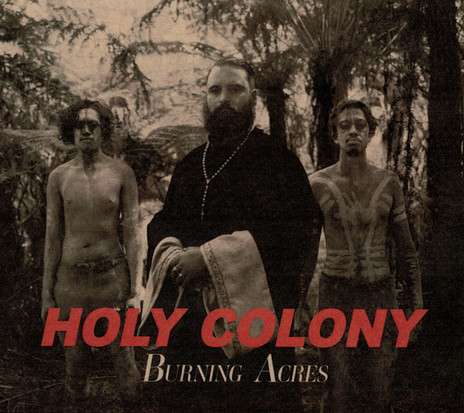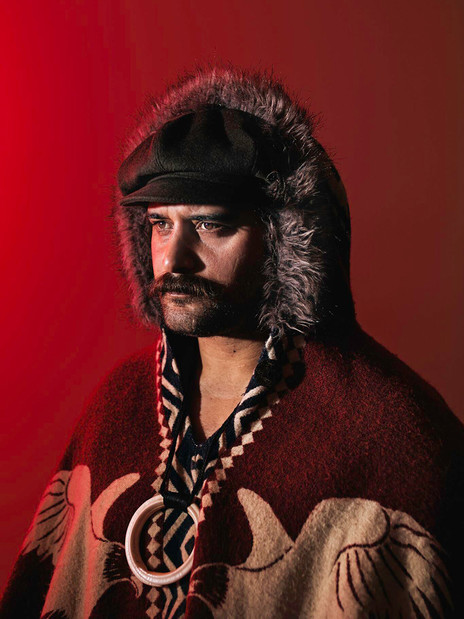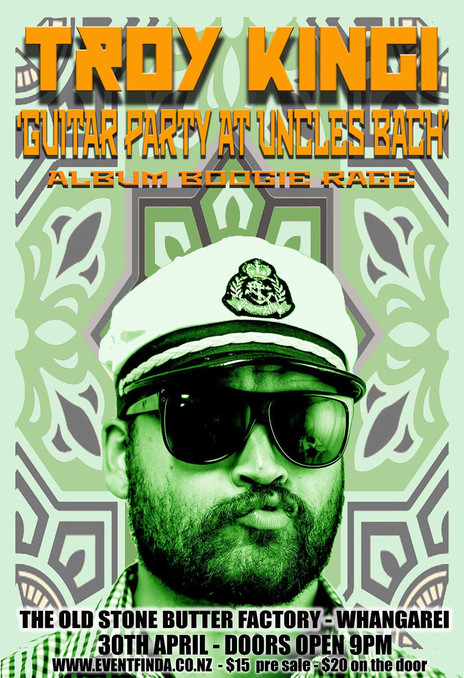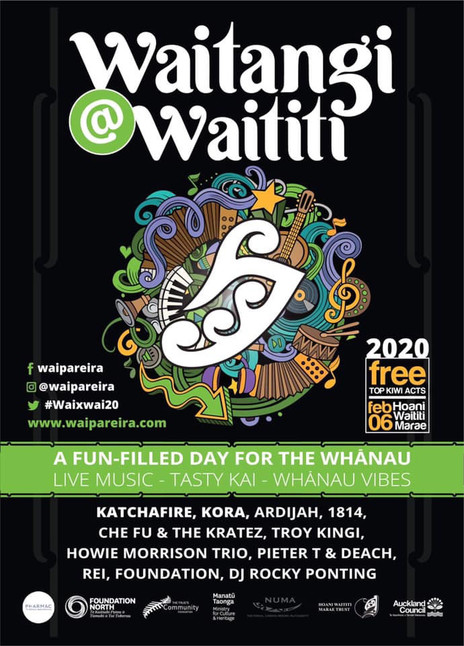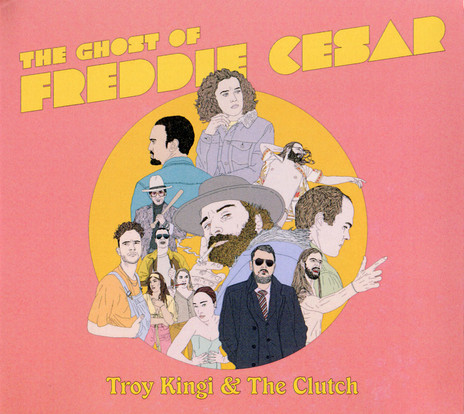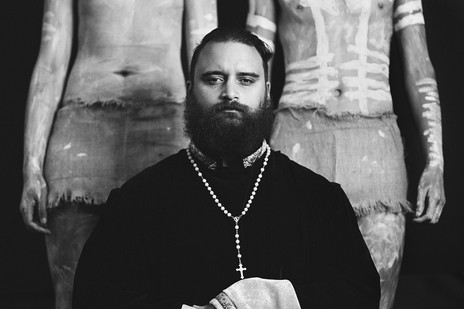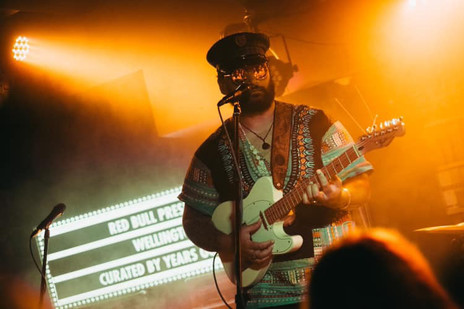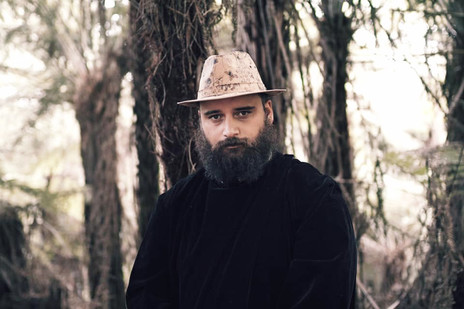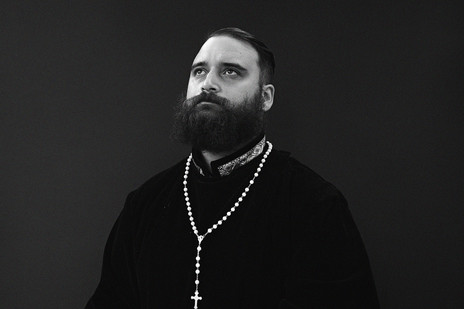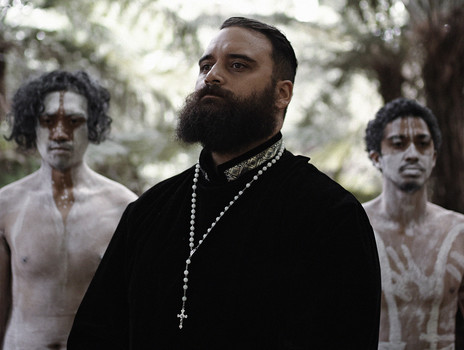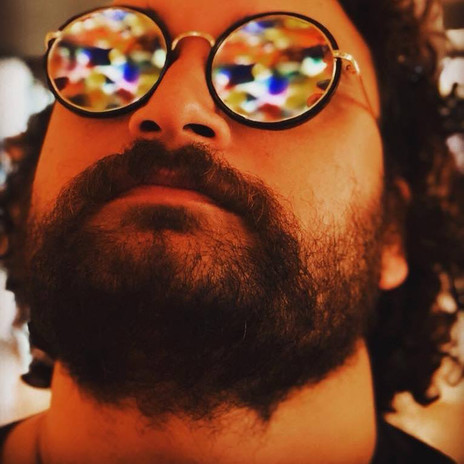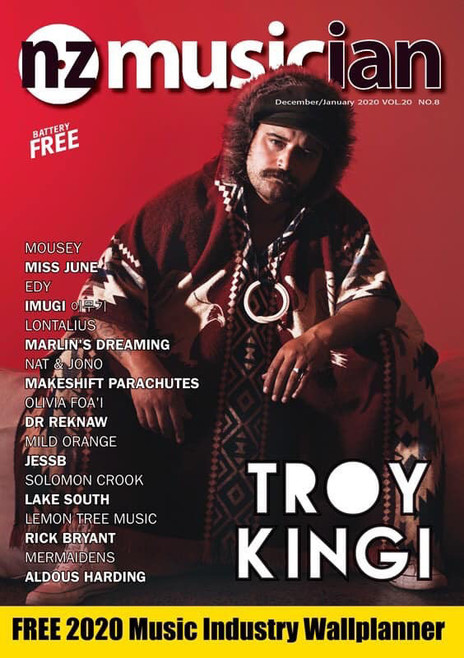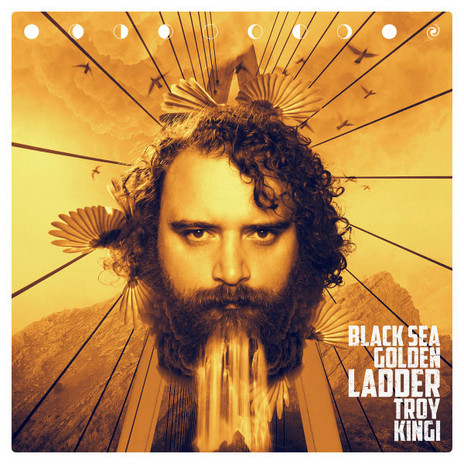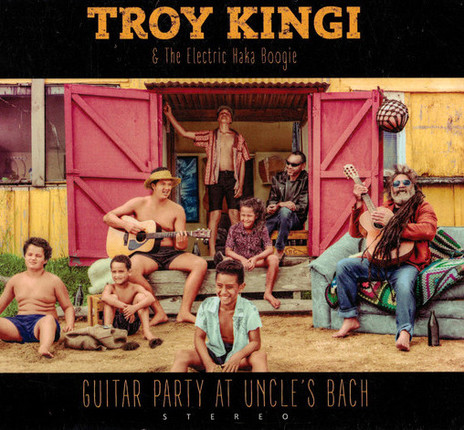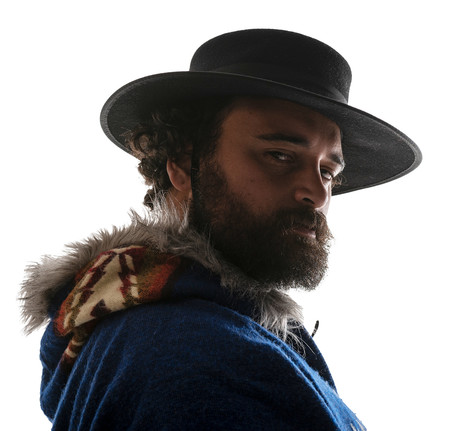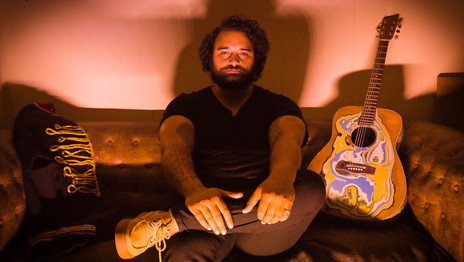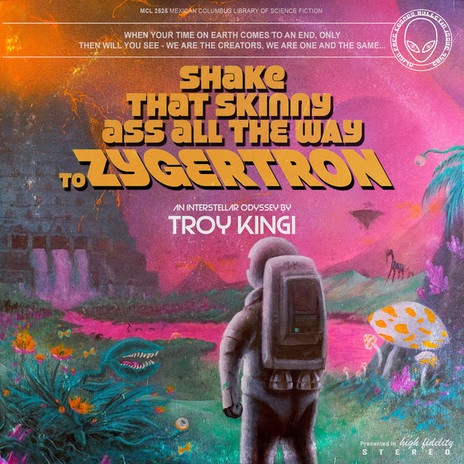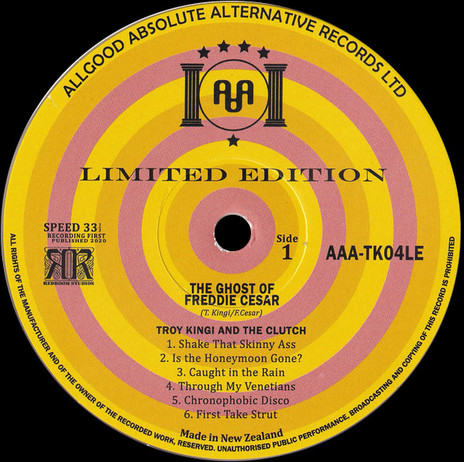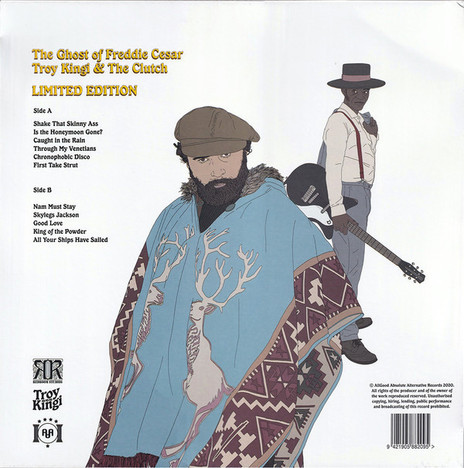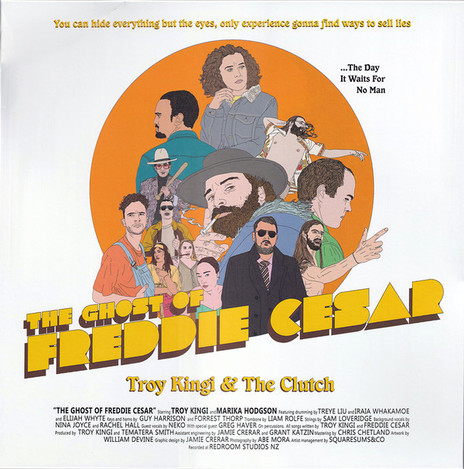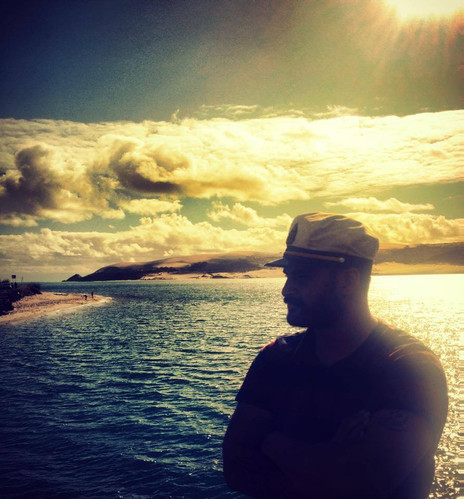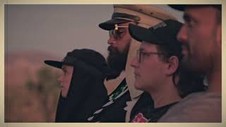As the 2020s decade began he was well on his way, having ticked off a 22-song double album, Guitar Party at Uncle’s Bach, in 2016 with his Electric Haka Boogie band, the tripped-out soul-psychedelics of Shake That Skinny Ass All the Way to Zygertron the following year, and political roots reggae album Holy Colony Burning Acres in 2019.
And these did not go unnoticed. As Kingi prepared for his next albums – maybe two in one year as he skipped 2018 – he could reflect on four Tūī music awards.
Kingi (Te Arawa, Ngā Puhi, Te Whānau-ā-Apanui) was born in the Far North and raised in Rotorua, Te Kaha and Kerikeri. He picked up guitar at Te Aute College in Hawke’s Bay and while at Kerikeri High School formed his first band, Toll House, which entered and won the local Smokefree Rock Quest.
In the decades since he has become a multi-instrumentalist, accomplished on bass, keyboards, drums and more.
Kingi created his own musical personality which reached as wide as it did deep.
When he was asked in 2016 after the launch of Guitar Party what song initially affected him he said, “I’d like to say ‘Black Dog’ – my dad would play Led Zeppelin IV from start to finish before school every morning and that was the very first track on the album.
“But I’ve been hearing ‘Summer Breeze’ a lot lately, the Isley Brothers version, and instantly remember being five again, so I’d have to go with that.”
His role models in music were, he said, “Doobie Brothers, Steely Dan, Jimi Hendrix, Bill Withers, Bob Marley – again, artists my dad would thrash on the turntable and on our car stereo.”
Out of such diverse influences from soul, hard rock, smooth pop and reggae, Kingi created his own musical personality which reached as wide as it did deep.
He studied at MAINZ in Auckland and returned to Kerikeri where he fronted a roster of short-lived bands, among them Mongolian Deathworm, Kingkachoo, Troy Kingi and the Tigers, and Full Moon Street.
But it was Typhoon Fools that gained him the most attention and led to him being cast in the 2013 Tearepa Kahi-directed film Mt Zion (as Hone), alongside Stan Walker and Temuera Morrison.
The role led to other film parts, in Himiona Grace’s 2014 The Pā Boys (with Francis Kora of the band Kora), Taika Waititi’s 2016 Hunt for the Wilderpeople, and a small part in the rugby movie The Kick (as All Black Piri Weepu).
He also appeared in series three of the musicians-and-prisoners documentary series Songs From the Inside, alongside Scribe, Anika Moa and Ladi6.
However, Kingi’s on-screen career – most of the work involving music as you’ll note – and his work with The Raid Movement in Northland, combatting teen suicide, has been incidental to his playing and recording.
He co-wrote the APRA Maioha Award-winning song ‘Aotearoa’ at the 2015 APRA Silver Scroll Awards with Stan Walker, had a side project with Mara TK (of Electric Wire Hustle) and Mark Vanilau in their soul band L(())VE & HOPE, and collaborated with Ria Hall, Maisey Rika and many others.
Guitar Party at Uncle’s Bach was not just a major debut statement – he was 32 when it appeared in 2016 – but was recorded live in just seven days with Ben Edwards in Lyttelton (“with sneaky dubbed audio from a New Year’s Party on Troy’s deck”).
It is a remarkable, free-wheeling collection which oozes laidback summer vibes but also, as I wrote in a review at the time, “pushes the parameters of groove into soul-funk, low-range psych soul, some grit-guitar rock, serious messages within the songs (fortunately not that you notice immediately), references to his parents’ Jimi albums and whānau …
“And dammit if they aren’t metal-aware (‘Picking Up Speed’), into a stupidly good 70s soul groove (‘Can’t Stop Feeling Strange’) and much more. And the man does bbq hard-rock/distorted blues politics (‘Oil Spill’) alongside low grooves, acoustic thoughtfulness (‘Moko’) and more.”
It was an album that always offered more, and as Alex Behan noted in a Stuff interview with Kingi, “[he] was exorcising his rock roots to clear the air for what was to come”.
What came immediately was recognition: best Māori pop artist and solo male artist at the Waiata Māori Music Awards.
But he was moving on fast and the following year delivered the even more out-there Shake That Skinny Ass All the Way to Zygertron, the preparation for which was listening to the Isley Brothers, Shuggie Otis, Al Green, the Meters ... ‘Aztechknowledgey’ – the opening track on the album – saw him nominated for the APRA Silver Scroll.
But that self-imposed “10 albums in 10 years” challenge beckoned and although he didn’t release anything in 2018, he was busy playing and writing and raising a family back in Northland.
Then came the deep roots consciousness reggae of Holy Colony Burning Acres in 2019, credited to Troy Kingi and the Upperclass. It had reference points in 70s Jamaican reggae and looked hard at colonialism around the world.
It could not have been more timely: Herbs’ classic debut Whats’ Be Happen? had been reissued and reminded people there was more to local reggae than a bbq ’n’ beach vibe, and land occupations in Aotearoa were in the headlines again.
“I have a lot of friends that are deep on reggae,” he told Sam Smith of NZ Musician in late 2019, “and they got a bit sceptical of me doing it. But I said I was trying to do a true roots-reggae album, meaning it had to either be about love or politics, so I chose that political avenue.
He picked up two more Tūīs (best Māori artist, best soul/R&B artist) to add to his others.
“The climate at the moment with what is going on at Ihumātao and Mauna Kea was also quite timely. I didn’t even think about that when I started writing, but then when it came out all of these things seemed to happen within months of each other, so it was really timely.
“I’m just using my platform to be a voice. I don’t know how big that platform is but there are things that need to be said.”
The music was certainly heard and the album appeared in a number of best-of-the-year lists, and he picked up two more Tūīs (best Māori artist, best soul/R&B artist) to add to his others.
It was also widescreen thinking when it came to its political agenda. “Initially it was only going to be about Māori politics,” he told Behan, “but I’ve got a few friends all over the world and chatting to them I thought, ‘Why don’t I broaden my catchment?’
“I remember when I did Mt Zion with Stan Walker and he told me he always thought Bob Marley was Māori. I think it’s because [Marley] would sing about minorities as if they were him, himself. And that made it easy for people to claim him as their own.
“So I’ve got a song about West Papua, I got a song about the Inuit. A song about Hawai’i. But when I sing those songs, I sing them in the first person.”
Political but personal ... and the work goes on. He expects his next album to be pure funk (he namechecks the Meters again) and after that possibly a folk album.
If there is a binding thread in Kingi’s work it is that his ears are wide open to all kinds of music, from classic blues to sweet soul and Jimi Hendrix.
He told me around the time of his debut that the three songs he’d love everyone to hear were Howlin’ Wolf’s ‘Spoonful’, Shuggie Otis’ ‘Aht Uh Mi Hed’ and Donny Hathaway’s live version of ‘Jealous Guy’.
Add that to the other artists he has mentioned and you have the image of a musician who not only refuses to be constrained by genre but has willingly set up the challenge to work across many. That is rare in an age when most artists prefer to find what works (sells, preferably) and mine it for all its worth.
Kingi is not like that at all, and that is what makes his career so interesting for us, and doubtless him too.
At the start of his recording career – just a few years ago and with that roadmap of albums all ahead of him – I asked him if, as David Bowie once said, “we’ve got five years”, how would he spend it?
Most musicians have answered that by saying touring, making music and so on. Troy Kingi, being different, answered, “By the beach eating seafood, listening to 70s soul records and playing NBA 2K with my kids (and anyone else in the neighbourhood who thinks they can beat me).”
As a man who, between bouts of recording, mostly stays at home in Kerikeri looking after his kids and being domestic with the family on their five acres, that too, is big-picture thinking.
--
Holy Colony Burning Acres was rewarded for its political bravery, with track ‘Mighty Invader’ making the APRA Silver Scroll shortlist and Kingi winning the prestigious Taite Music Prize for 2020. The award came with $12,500 plus studio time and a year’s supply of Red Bull – the latter being a strange addition from the sponsor, albeit a helpful one for a musician with five kids and an ambitious album quota.
“Honestly… thought I had no chance,” said Kingi in his acceptance speech, self-filmed at home due to the coronavirus lockdown. “All my indigenous brothers and sisters that sent in – we had hundreds of them – sent in poems, karakia, stories, thoughts … everyone single one of you made this album what it is, so thank you so much. This is us, this album is us.”
Kingi is also in the process of re-recording the album in te reo Māori, telling Newshub, “When they start seeing these mainstream people and in different genres playing their music in te reo, it makes it easier for them to venture out into that sort of realm without feeling like ‘I’m going to be judged’. It’s just becoming more acceptable, not as scary.”
Impressively, the pandemic did not stop Kingi from keeping up with his yearly target, and album number four was released in September 2020. The Ghost of Freddie Cesar is Kingi’s foray into the world of funk, backed by The Clutch, the latest iteration of his band name.
The story behind 2020’s ‘Ghost of Freddie Cesar’ album is both strange and sad.
The story behind the album is both strange and sad, with the inspiration being Kingi’s most personal to date. In 2005, Kingi’s father mysteriously went missing, and has not been seen or heard of, to this day. Two years into his disappearance, Kingi was sorting through his father’s belongings when he came across a cassette entitled “Freddie Cesar” in hand drawn marker. The tape contained a live set from Cesar – whom Kingi had never heard of before, but could gauge from the songs that he had lived through military service and the ensuing trauma and addiction. As a therapeutic exercise, Kingi wrote out Cesar’s lyrics into a notebook and when the tape was lost, the notebook was all that was left. Years later, the scrawled lyrics of Freddie Cesar became the building block of Kingi’s new album, of which everything else was built.
Kingi describes the new collection as “kind of a dedication to my dad and Freddie Cesar, this album. Even though the lyrics aren’t fully mine and the music’s not fully mine, I feel him when I’m singing these songs.” With the cassette tape lost, Kingi only referred to a few melodies from memory, and the rest was up to his own interpretation, calling the work as “50 percent me, 50 percent Freddie.”
The project helped Kingi gain a sense of connection to his dad, as well as some sense of closure to his disappearance. “When I was writing this album there were moments where, I don’t know if I felt his presence more than just nostalgic feelings,” Kingi told Priya Sami for Under the Radar, “definitely where I finished mixing the last song for the album, it was a massive weight off my shoulders. I don’t know what that meant. Probably more that I don’t have to remember these songs anymore, they’re tracked now, I can just let it go.”
The process spanned two years, from the song selection during the making of Holy Colony, Burning Acres, to the final mix. “The recording process, just like the other ones, it’s pretty quick,” Kingi told Sami. “We got in the studio and smashed out the bones of it in two days. All the drums, bass and guitar. And that’s how I like to work with all my albums. The base of it, we brought that live vibe and then we start layering it with everything else.”
The release went off with a bang – selling out all their special edition vinyl, topping the NZ Album Charts and making it to No.2 in the Official Album Charts.
The supporting music videos and artwork had a lot of fun playing up the tropes of 1970s funk and soul – all swagger and glamour and campy mystery, with references to Blaxploitation film.
The success of album four arrived simultaneously to the making of album five. As the recipient of the Mātairangi Mahi Toi Māori Artist in Residence, Kingi was invited to live at Government House in Wellington and record at Massey University’s studio. The upcoming album even has a proposed name – A 75+ Year Trip to Perpetual Sleep – and is a marriage of composition and poetry, produced by Delaney Davidson.
– Updated by Rosie Howells, September 2020
--
In 2021 Troy Kingi released his fifth album, Black Sea Golden Ladder, produced and co-written by Delaney Davidson. The following year it received the Best Folk Artist Tūī as part of the NZ Music Awards, while Delaney Davison and Jol Mulholland also received Te Kaiwhakaputa Toa/Best Producer award for their work on it (Mulholland was also awarded Te Kaipukaha Toa/Best Engineer).
In a ceremony held March 2022, Troy Kingi was awarded the 2021 APRA Silver Scroll award for ‘All Your Ships Have Sailed’, from his 2020 album The Ghost of Freddie Cesar. Interviewed for The Big Idea arts website, Kingi said, “I’ve been watching the Silver Scrolls for as long as I can remember, before I even started on this journey. It feels a little bit surreal ... If I was to never get any awards again, I’m happy I’ve got this one.”
Kingi found a fun source of inspiration in exploring music from 1984, the year of his birth
Kingi kept up his breakneck pace, re-recording the entirety of the vocals of Holy Colony, Burning Acres in te reo Māori to create a new version, Pū Whenua Hautapu Eka Mumura (2022). He found a fun source of inspiration in exploring music from the year of his birth, 1984, and Year of the Rat Bags and Their Musty Theme Songs was brimming with synth hooks and dramatic 80s vocals, especially on the standout single ‘Paparazzo S.J.’ He even added a few classic hits to his live shows (‘Kiss’ by Prince, ‘Don’t You Want Me’ by The Human League, and ‘Faith’ by George Michael).
Kingi admitted in the press release for the album that he was having a block when writing new material: “Lately I’ve actually been feeling alienated by my own voice, it’s just the older I get, the more my voice is changing, and honestly I feel for the worse. So I thought what better way to get myself out of the self-loathing vocal dump and rejuvenate the creative spices than to just stop singing and let the music speak for itself."
Fortunately, the musicians he’d gathered around him had a powerful sense of feel, so he leant more heavily on them, while also drawing on his experience of doing soundtrack work to create the largely-instrumental work Time Wasters – Soundtrack to Current Day Meandering (2023). The most striking singing on the album ended up being provided by his nine-year-old daughter Āio on ‘Krispy Kreme’.
Kingi needed a reset for album eight so booked the legendary Rancho de la Luna studio in Joshua Tree (California) to explore the desert/stoner rock sound that is most associated with the music of Josh Homme (both through his bands Kyuss and Queens of the Stone Age, as well as the Desert Sessions series). Kingi had been a fan of this music in his youth, so it made sense for him to collaborate with two musicians he’d known since those days. Drummer Trey Liu and guitarist Ezra Simmons were both students at Kerikeri High School when Kingi was an itinerant teacher there. Liu began playing with Kingi at 16 years old, while Ezra found his own notoriety as the drummer for Earth Tongue. Rounding out the team were Kingi’s go-to bassist Marika Hodgson and his longtime producer TeMatera Smith.
A film crew joined them to create Troy Kingi’s Desert Hīkoi, a short TV series that documented not only the recording process, but showed them connecting with representatives of the local Native American tribe who took them to a sacred location nearby and led them through a sweat lodge ritual (inspiring the song ‘Hot Medicine’). Kingi broke through his creative block and powered out a 16-song collection, Leatherman & the Mojave Green (2024), including the big riffing ‘Ride The Rhino’ which detailed a psychedelic experience he had in California, mellow number ‘Cactus Handshake’ (which the band was renamed after), and full-metal riffing of ‘Momentary Lapse of Deflation’ (with screamed vocals by Simmons).
Present for the sessions was the co-founder of the studio, Dave Catching (Eagles of Death Metal). He was so impressed with the band that he asked them to help him record his own contribution for an upcoming album being put together to celebrate the studio, developing a complete song from just a few guitar licks he showed them. Kingi was clearly at a level where he could find respect amongst those who had worked with the musical idols he’d had as a young man. He left the experience rejuvenated, ready for the next two albums that lay ahead.
– Update by Gareth Shute, September 2024
